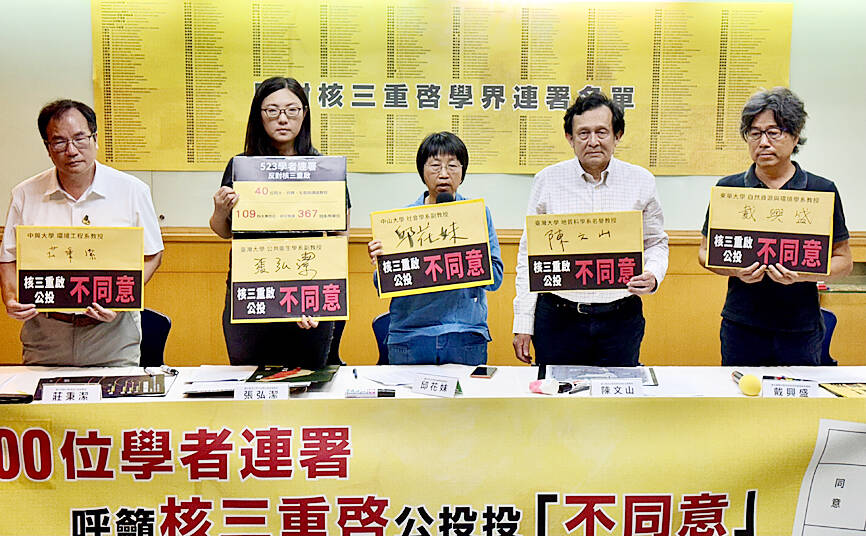More than 523 academics have signed a statement urging the public to vote “no” in Saturday’s referendum to restart the Ma-anshan Nuclear Power Plant.
A tectonic fault line in Pingtung County’s Hengchun Township is 900m from the reactors at the facility and a protrusion from an earthquake could spell disaster, Chen Wen-shan (陳文山), a professor in National Taiwan University’s Department of Geology, told a news conference in Taipei yesterday, citing 2015 and 2022 reports by Taiwan Power Co.
The geological layer on which the power plant rests is relatively young and a large earthquake might occur there, Chen said.

Photo: Hunag Yi-ching, Taipei Times
Storing spent fuel rods underground was possible in theory, but no site survey has been conducted, he said, adding that with daily compression of the Earth’s crust in Taiwan, fuel rods might become stuck and irretrievable.
Tsuang Ben-jei (莊秉潔), professor of environmental engineering at National Chung Hsing University, said that if something similar to what befell the Fukushima Dai-ichi plant in Japan in 2011 happened at the Ma-anshan site, Taitung County, Kaohsiung, Pingtung County and Hengchun Township (恆春) would have a 5 percent, 5 percent, 10 percent and 70 percent chance respectively of becoming permanent exclusion zones.
Moreover, the Kuroshio current flows off Hengchun, so fisheries near Taiwan would be affected, Tsuang said.
Tai Hsing-sheng (戴興盛), a professor of natural resources and environmental studies at National Dong Hwa University, said that nuclear power does not meet the EU’s standards for financial sustainability.
A levelized cost of electricity assessment shows that nuclear power has a far higher average cost of generating electricity over the lifespan of a facility than power from renewable sources, Tai said.
The overheads of nuclear waste processing, as well as the social and economic effects of nuclear disasters, have not been factored into calculations, Tai added.
Chiu Hua-mei (邱花妹), an assistant professor of sociology at National Sun Yat-sen University, said that Pingtung County residents coexisted with the risk of a nuclear disaster for four decades.
However, most of them are unaware that the facility faced abnormalities or circumvented regulations 30 times, Chiu said.
County residents should not be forced to live with nuclear power any longer and to do so would be enacting regional injustice, she said.
On Monday, a source in the Democratic Progressive Party (DPP), who asked not to be named, said that DPP politicians and local officials would increase campaigning to urge “no” votes in the referendum.
“We must directly confront the disinformation and false narratives being disseminated, and also remind the public that the opposition parties have changed their position on nuclear energy,” the source said.
Many leading figures in the Chinese Nationalist Party (KMT) and the Taiwan People’s Party once opposed nuclear energy, but now they embrace it, they said.
“Their U-turn is beyond what a normal person would consider reasonable, which shows that the referendum is a mere political show,” they added.
Additional reporting by Chen Yun

Japanese footwear brand Onitsuka Tiger today issued a public apology and said it has suspended an employee amid allegations that the staff member discriminated against a Vietnamese customer at its Taipei 101 store. Posting on the social media platform Threads yesterday, a user said that an employee at the store said that “those shoes are very expensive” when her friend, who is a migrant worker from Vietnam, asked for assistance. The employee then ignored her until she asked again, to which she replied: "We don't have a size 37." The post had amassed nearly 26,000 likes and 916 comments as of this

US President Donald Trump said "it’s up to" Chinese President Xi Jinping (習近平) what China does on Taiwan, but that he would be "very unhappy" with a change in the "status quo," the New York Times said in an interview published yesterday. Xi "considers it to be a part of China, and that’s up to him what he’s going to be doing," Trump told the newspaper on Wednesday. "But I’ve expressed to him that I would be very unhappy if he did that, and I don’t think he’ll do that," he added. "I hope he doesn’t do that." Trump made the comments in

Tourism in Kenting fell to a historic low for the second consecutive year last year, impacting hotels and other local businesses that rely on a steady stream of domestic tourists, the latest data showed. A total of 2.139 million tourists visited Kenting last year, down slightly from 2.14 million in 2024, the data showed. The number of tourists who visited the national park on the Hengchun Peninsula peaked in 2015 at 8.37 million people. That number has been below 2.2 million for two years, although there was a spike in October last year due to multiple long weekends. The occupancy rate for hotels

A cold surge advisory was today issued for 18 cities and counties across Taiwan, with temperatures of below 10°C forecast during the day and into tonight, the Central Weather Administration (CWA) said. New Taipei City, Taipei, Taoyuan and Hsinchu, Miaoli and Yilan counties are expected to experience sustained temperatures of 10°C or lower, the CWA said. Temperatures are likely to temporarily drop below 10°C in most other areas, except Taitung, Pingtung, Penghu and Lienchiang (Matsu) counties, CWA data showed. The cold weather is being caused by a strong continental cold air mass, combined with radiative cooling, a process in which heat escapes from